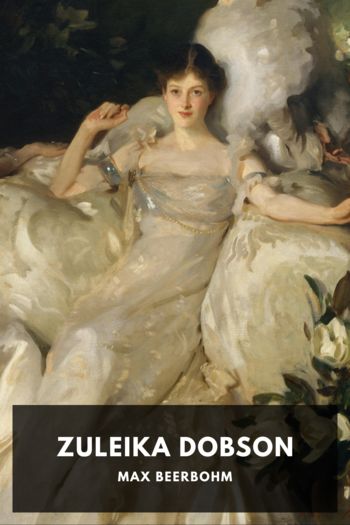The Works of Max Beerbohm - Max Beerbohm (electric book reader .txt) 📗

- Author: Max Beerbohm
Book online «The Works of Max Beerbohm - Max Beerbohm (electric book reader .txt) 📗». Author Max Beerbohm
But, with her grave insouciance, Miss Cissie Loftus had much of the reserve that is one of the factors of feminine perfection, and to most comes only, as I have said, with artifice. Her features played very, very slightly. And in truth, this may have been one of the reasons of her great success. For expression is but too often the ruin of a face; and, since we cannot, as yet, so order the circumstances of life that women shall never be betrayed into “an unbecoming emotion,” when the brunette shall never have cause to blush nor La Gioconda to frown, the safest way by far is to create, by brush and pigments, artificial expression for every face.
And this—say you?—will make monotony? You are mistaken, toto caelo mistaken. When your mistress has wearied you with one expression, then it will need but a few touches of that pencil, a backward sweep of that brush, and ho, you will be revelling in another. For though, of course, the painting of the face is, in manner, most like the painting of canvas, in outcome it is rather akin to the art of music—lasting, like music’s echo, not for very long. So that, no doubt, of the many little appurtenances of the Reformed Toilet Table, not the least vital will be a list of the emotions that become its owner, with recipes for simulating them. According to the colour she wills her hair to be for the time—black or yellow or, peradventure, burnished red—she will blush for you, sneer for you, laugh or languish for you. The good combinations of line and colour are nearly numberless, and by their means poor restless woman will be able to realise her moods in all their shades and lights and dappledoms, to live many lives and masquerade through many moments of joy. No monotony will be. And for us men matrimony will have lost its sting.
But that in the world of women they will not neglect this art, so ripping in itself, in its result so wonderfully beneficent, I am sure indeed. Much, I have said, is already done for its full revival. The spirit of the age has made straight the path of its professors. Fashion has made Jezebel surrender her monopoly of the rouge-pot. As yet, the great art of self-embellishment is for us but in its infancy. But if Englishwomen can bring it to the flower of an excellence so supreme as never yet has it known, then, though Old England lose her martial and commercial supremacy, we patriots will have the satisfaction of knowing that she has been advanced at one bound to a place in the councils of aesthetic Europe. And, in sooth, is this hoping too high of my countrywomen? True that, as the art seems always to have appealed to the ladies of Athens, and it was not until the waning time of the Republic that Roman ladies learned to love the practice of it, so Paris, Athenian in this as in all other things, has been noted hitherto as a far more vivid centre of the art than London. But it was in Rome, under the Emperors, that unguentaria reached its zenith, and shall it not be in London, soon, that unguentaria shall outstrip its Roman perfection! Surely there must be among us artists as cunning in the use of brush and puff as any who lived at Versailles. Surely the splendid, impalpable advance of good taste, as shown in dress and in the decoration of houses, may justify my hope of the preeminence of Englishwomen in the cosmetic art. By their innate delicacy of touch they will accomplish much, and much, of course, by their swift feminine perception. Yet it were well that they should know something also of the theoretical side of the craft.





Comments (0)